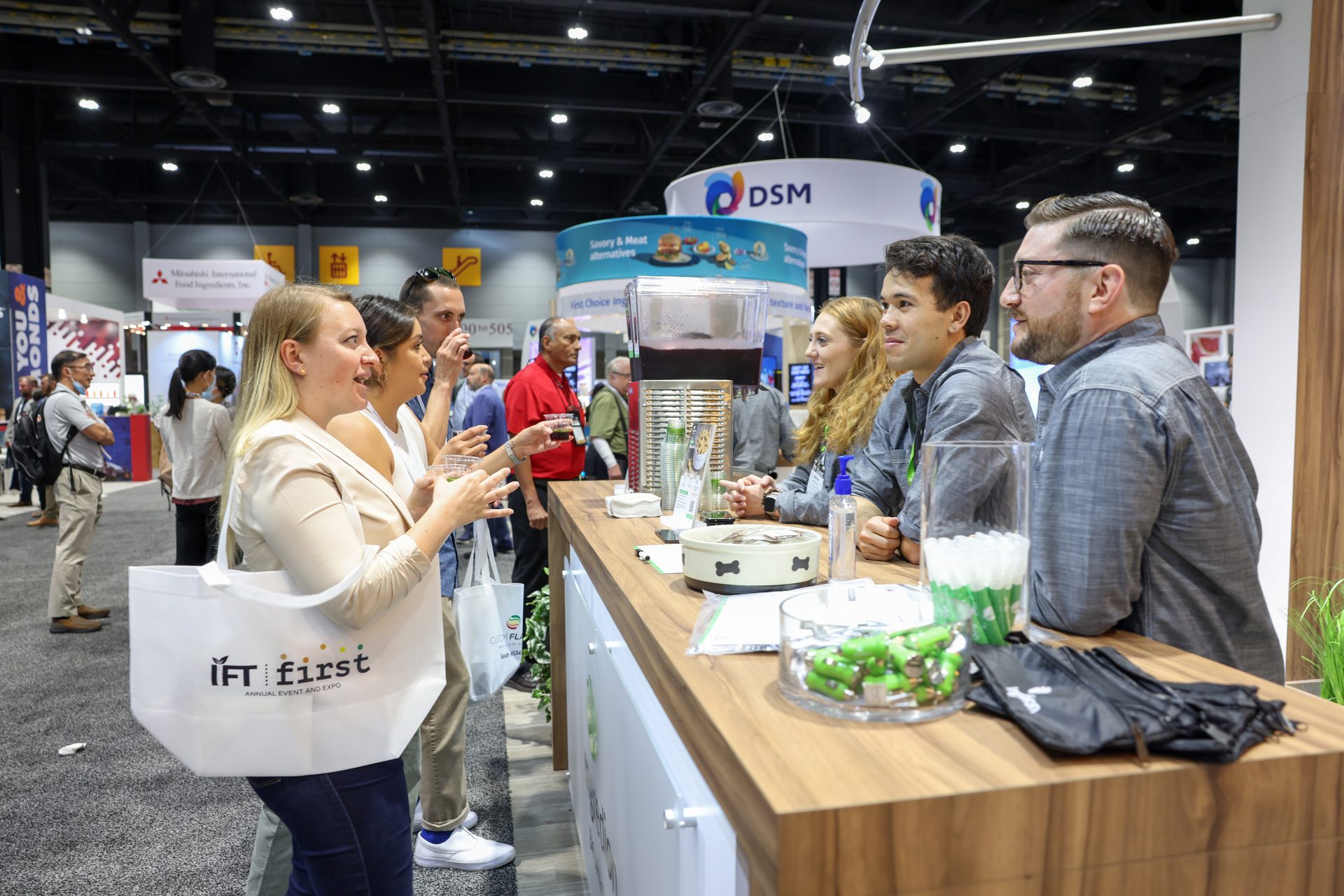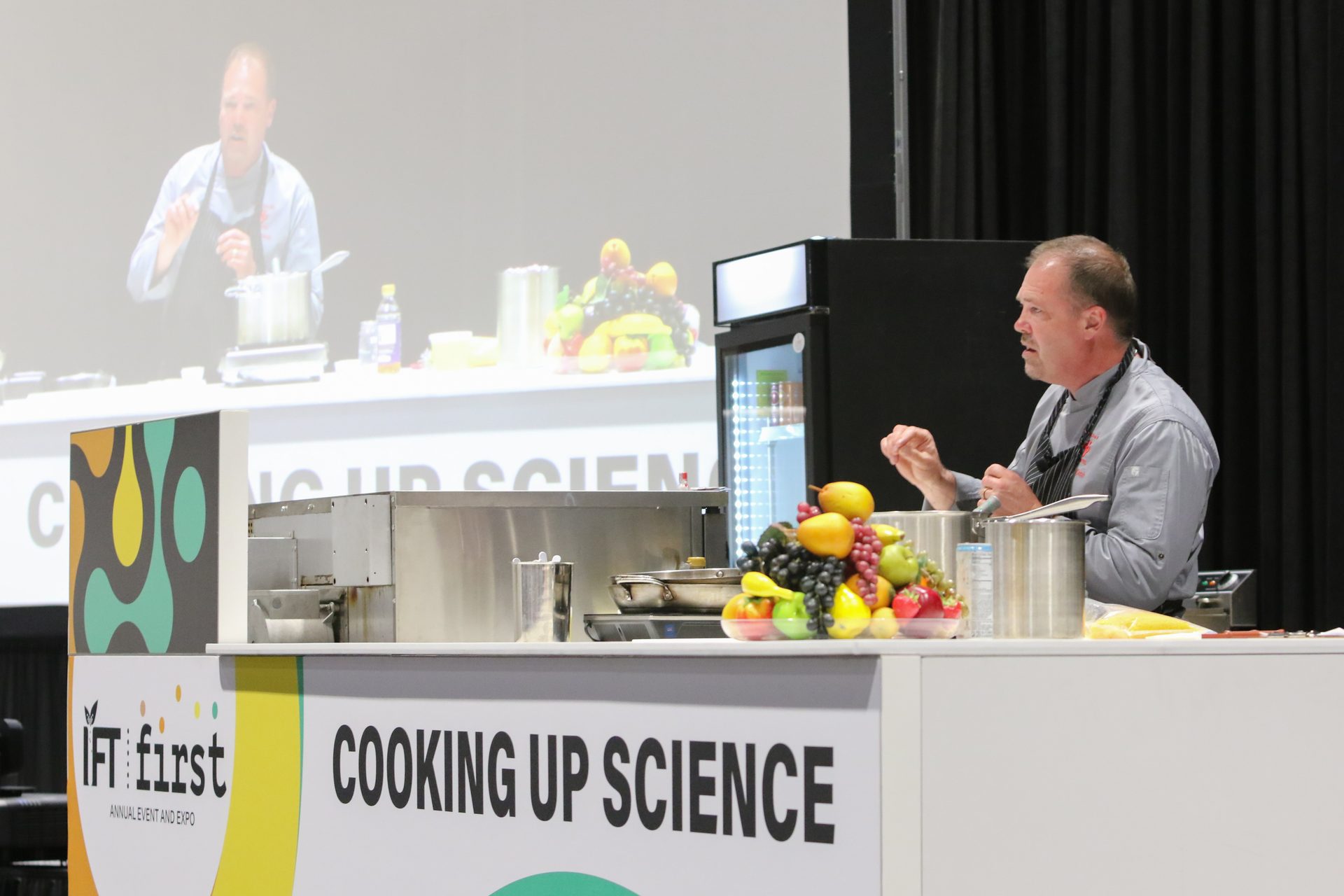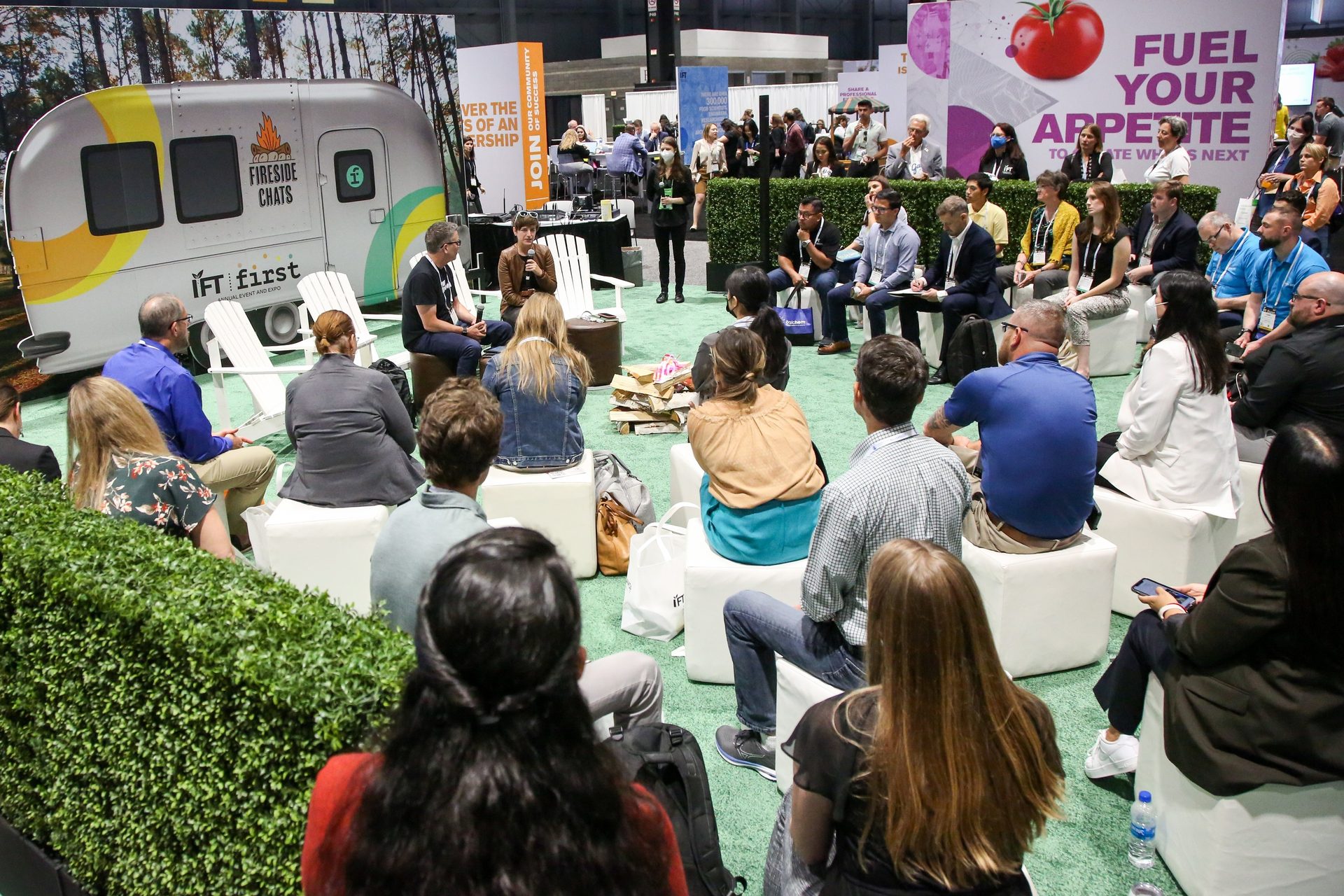IFT FIRST
SHOW PREVIEW
The BOTTOM LINE
- Automation has been advancing rapidly
- The tech can help alleviate labor challenges
- Robots save humans from dull, dirty, and dangerous tasks
The future of food
IFT FIRST (July 16–19 in Chicago) will gather food industry pros to talk insights and innovation.
Jenni Spinner, Chief Editor
Science helps move the food field forward. From R&D around creating or improving snack and bakery ingredients, to exploring emerging technologies, and beyond, such work can help producers do their job more effectively, efficiently, and affordably.
IFT FIRST is an event aimed at helping such progress in food science. Produced by the Institute of Food Technologists, a nonprofit scientific organization committed to the science of food, the event is scheduled July 16-19 at McCormick Place in Chicago. Christie Tarantino-Dean, CEO of IFT, connected with Snack Food & Wholesale Bakery and shared highlights of the show, as well as advice for attendees on getting the most out of their show experience.
Jenni Spinner: The theme this year tackles “future-proofing” the food system—could you please elaborate as to what that means, and how it sets the tone for the IFT FIRST event?
Christie Tarantino-Dean: Future-proofing means to make something unlikely to fail in the future, and every aspect of this year’s IFT FIRST event is designed to ensure a long, healthy future for our global food supply. Achieving this will require innovative solutions throughout all aspects of the food value chain, with science and technology playing a critical role in the successful future-proofing of the food system. Everything at IFT FIRST—from the educational sessions to networking events to the exhibit floor—is designed to help attendees on that journey toward future-proofing the food system, especially at this critical time when we are facing significant challenges.

Courtesy of IFT
JS: Could you please share some of the key benefits of attending IFT First?
CTD: IFT FIRST is the place where the science of food community will gather to debate and discuss science and new innovations, explore ingredients and technologies for the future, and collaborate on key issues impacting the global food system. This year’s Food Expo will feature more than 850 exhibitors offering the latest in food science intelligence, non-stop food tastings, and exposure to food tech innovation.
There will also be a Startup Pavilion where 100 founders from 13 different countries will share burgeoning ideas and innovations and participate in a multi-day pitch competition. There are also more than 100 scientific sessions and multi-disciplinary discussions focused on groundbreaking science and solutions in novel technology and innovation, sustainability and climate, and food safety. This year’s event will also include nearly 500 posters featuring cutting-edge science and research impacting the future of food.
Fireside chats and Business FIRST sessions on the Expo floor will offer attendees 20- to 30-minute case studies and presentations on trends, ingredients, and applied science.
There are also multiple opportunities for high-value, intentional networking with science of food professionals who can help attendees achieve their goals, including special “Braindates” for peer-to-peer engagement, as well as a Professional Networking event featuring 19 Division (IFT’s shared interest groups) socials and more than a dozen topic or identity-based networking hours.
JS: Then, please tell us about some of the highlights of this year’s agenda—are there any must-attend sessions or speakers?
CTD: This year, IFT has assembled one of its strong lineups of keynotes, speakers, and panelists. This includes Duncan Wardle, former head of innovation and creativity at Disney. He will deliver the opening keynote, “Embedding Innovation into Everyone’s DNA,” on Monday, July 17. This session covers common mistakes companies make when advancing innovation throughout their organizations. Wardle will also share his personal successes at Disney, including how attendees can also make creativity tangible, innovation easy, and the process enjoyable.
The second-day keynote will include three winners from the second annual Seeding The Future Global Food System Challenge discussing “Innovation Across the Supply Chain for Healthy People and Planet.
The final day keynote will include both small and large companies dispelling the myth that small companies have an edge over large companies when it comes to innovating and bringing new products of technologies to market quickly in “David and Goliath: Considering How Organization Size Impacts Innovation.”
Image courtesy of kzenon via iStock / GettyImagesPlus
JS: Could you please tell us a bit more about Science FIRST?
CTD: There will be five featured sessions, each featuring a panel of food experts from around the world. “Reimaging Food Waste to Put the ‘P’ in Profit & Loss” will examine the hottest product innovation ideas capitalizing on upcycled food waste or by-products, which in turn will help attendees significantly improve the profit and loss statement at their respective organizations.
“Food Tech Innovations That Are Changing How the World Eats” will feature leading food tech companies sharing the latest groundbreaking innovations that have forever-changed food consumption. From tailor-made stabilizing solutions to precision fermentation techniques to biomanufacturing, innovative products are adding value across the food supply and serving as the next generation of protein solutions or sustainable ingredients.
“Science of Food Is Critical to Finding Urgent Health and Nutrition Solutions for a Growing Global Population” features a can’t-miss collection of experts discussing the important role food science plays in addressing global crises. From formulation and production to packaging and palatability, food science professionals are critical to bringing forward solutions at scale that consumers want, and the planet needs to help achieve these goals.
“Expect the Unexpected: Failure to Anticipate Threats Is a Critical Food Safety Risk” will address the tough questions organizations must be asking themselves, including what type of investments must be made and what strategies must be implemented now, to meet today’s food safety risks. The final education session will be a consumer panel focusing on “How Consumers’ Food Choices Are Impacted by Crisis”. The panel will look at how the food community can work together to bolster trust among consumers to create a more transparent and sustainable future.
JS: What about Business FIRST?
CTD: Business FIRST is presented by IFT’s flagship magazine, Food Technology, and the Omnivore podcast. The first of four Business FIRST sessions will be “Building the Business Case for Regenerative Agriculture,” which will focus on the impact regenerative agriculture will have on product development as a diverse group of experts weigh in on the opportunities and challenges in building a regenerative ingredient supply chain. The session will also focus on the strides some food manufacturers have already made in this area.
Convincing investors and consumers to buy into a brand-new product concept or a cutting-edge technology isn’t a slam-dunk for startups, no matter how good the idea is. “Marketing Disruptive Businesses to Investors and the Public” will feature a group of food system innovators discussing how they honed their messages, reached the right audiences, overcame initial resistance, and found their niches in the marketplace.
Courtesy of IFT

Courtesy of IFT
Later that day, attendees can find out how food and ingredient manufacturers pivoted to overcome supply chain failures and create opportunities for success in other parts of the business, including high-tech logistics and DE&I initiatives. In “How to Navigate a Supply Chain Failure”, attendees will get expert insights and takeaways through the lens of procurement, R&D, food safety, and quality assurance.
Wrapping the Business FIRST educational sessions will be a session on “Adapting to New Realities of Food Product Development.” Professionals must adapt and navigate a constantly changing slate of data inputs, timelines, budgets, and novel production technologies. A panel of R&D professionals will discuss what new skillsets are required and how they’ve retooled to build and maintain a nimble, effective, and collaborative team.
JS: Could you also please tell us about the Startup Pavillion?
CTD: In the Startup Pavilion, food or food-related startups will have the opportunity to participate in a multi-stage rapid-pitch competition spanning three days. Judges will include leaders from innovation, venture-capital investment groups, product development, academia, and the startup community. Space is limited as the competition is restricted to the first 100 startups to have a kiosk in the Pavilion. The grand-prize winner of The Pitch will receive $10,000, with the two runner-up companies receiving $2,500 each. The prize packages are courtesy of the Seeding The Future Foundation. Finalists from The Pitch will also have an opportunity to attend an invitation-only networking event. The two-hour Connecting for a Better Food System VIP Networking Event, which will immediately follow The Pitch, will connect startups and social enterprises with potential investors and supporting partners.



